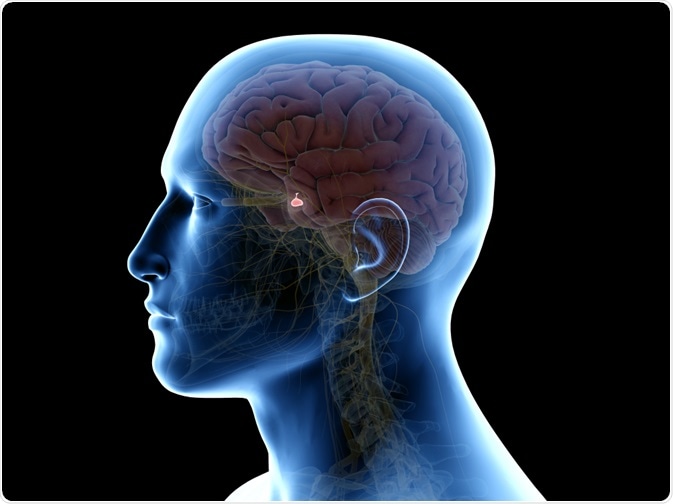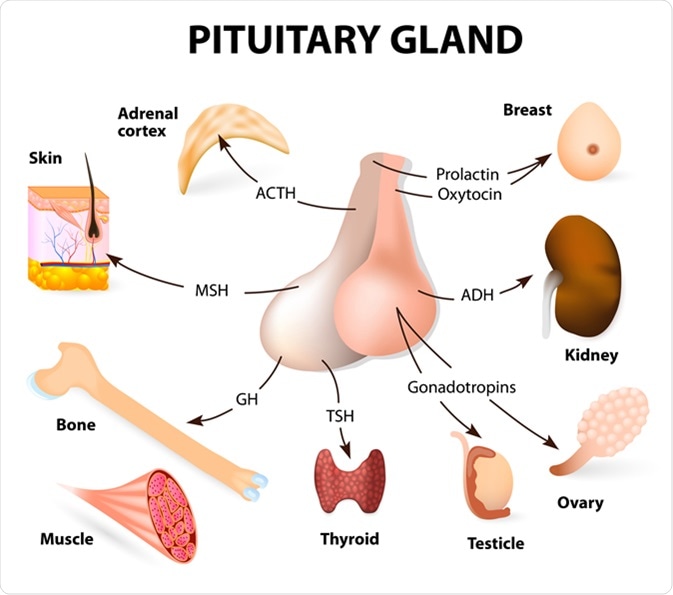The pituitary gland is a pea-sized endocrine gland that is situated in the middle of the skull base and kept protected within a bony cavity called the sella turcica. It plays an essential role in regulating the functions of various other endocrine glands and maintaining overall hormone levels in the blood.
 Image Credit: Sebastian Kaulitzki / Shutterstock.com
Image Credit: Sebastian Kaulitzki / Shutterstock.com
How does the pituitary gland work?
The pituitary gland is divided into two parts: anterior pituitary gland and posterior pituitary gland. The gland is connected to another brain structure called the hypothalamus by a stalk comprising blood vessels and nerve fibers. The anterior lobe is mainly composed of hormone-secreting epithelial cells, whereas the posterior lobe contains unmyelinated nerve fibers coming from the hypothalamus.
Under the control of the hypothalamus, the pituitary gland controls the autonomic nervous system, which plays an essential role in regulating various involuntary functions of the body, including body temperature, hunger and thirst, urination, heartbeat, and sleep. The hormones secreted by the pituitary gland are vital regulators of most of the other endocrine glands. In addition, some hormones directly control the function of specific organs.
The pituitary hormones are released directly into the blood and travel through the blood vessels until they reach specific target organs. The production and secretion of hormones by the anterior lobe are under the regulation of the hypothalamus, which, depending on the body’s need, produces ‘releasing hormones’ or ‘inhibiting hormones’ to subsequently induce or suppress hormone release by the anterior lobe, respectively.
The production of anterior lobe hormones is also regulated by hormone levels in the blood. For example, the pituitary gland stops producing TSH if there is enough thyroid hormone in the blood. Similarly, the gland starts producing TSH when the thyroid hormone levels are low in the blood.
 Image Credit: Designua / Shutterstock
Image Credit: Designua / Shutterstock
What are the hormones secreted by the pituitary gland?
There are four hormones secreted by the anterior pituitary gland that control the functions of other endocrine glands. These hormones include thyroid-stimulating hormone (TSH), adrenocorticotropic hormone (ACTH), follicle-stimulating hormone (FSH), and luteinizing hormones (LH). In addition, the anterior lobe secretes two more hormones that have direct effects on specific organs. These hormones include growth hormone (GH) or somatotropic hormone (STH) and prolactin.
Regarding the posterior pituitary gland, two different hormones, namely oxytocin and antidiuretic hormone (ADH), are stored there. These hormones are secreted depending on the body’s need.
What are the functions of pituitary hormones?
The hormones secreted by the pituitary gland play a crucial role in the regulation of important physiological functions.
Thyroid-stimulating hormone (TSH) – a glycoprotein that stimulates the production and secretion of thyroid hormones (T3 and T4) by the thyroid gland. The thyroid hormones play a vital role in regulating metabolism, energy homeostasis, growth, and nervous system activities. An overproduction of TSH leads to hyperthyroidism, whereas a lack of TSH causes hypothyroidism.
Adrenocorticotropic hormone (ACTH) – stimulates the adrenal gland to release stress hormones, especially cortisol. Under stressful conditions, cortisol is released in high amounts in the blood and regulates the body’s reaction to stress. In particular, cortisol increases glucose metabolism, regulates blood pressure, and reduces inflammation. In addition, cortisol plays a central role in fight or flight response, which is an adaptive response of the body to perceived threats. Overproduction of ACTH can lead to Cushing’s syndrome, whereas a low ACTH level can result in adrenal insufficiency.
Follicle-stimulating hormone (FSH) and luteinizing hormones (LH) – these hormones are collectively known as gonadotrophins, which stimulate the ovary to release estrogen and progesterone and the testes to release testosterone. Both LH and FSH play important roles in regulating the growth and maturation of sperm and egg cells. Abnormal production of these hormones causes menstruation-related problems, sexual malfunction, and infertility.
Growth hormone (GH) – this hormone stimulates growth in children and participates in maintaining various body tissues/organs in adults, including bones, liver, and fat and muscle tissues. In adults, the overproduction of GH causes acromegaly, which is characterized by increased bone size. In children, too much GH causes gigantism, a condition of abnormal growth.
Prolactin – this hormone stimulates the mammary glands to produce milk after childbirth. A high prolactin level can affect the functions of ovary and testes.
Antidiuretic hormone (ADH) – this hormone is also known as vasopressin. It controls water retention by the kidney and regulates fluid balance and mineral concentration in the body. It also causes constriction of the blood vessels. A low ADH level can increase urination and trigger a thirsty feeling. This condition is known as diabetes insipidus.
Oxytocin – this hormone stimulates uterine contraction, which is essential during the delivery of a baby. It also stimulates milk secretion during breastfeeding.
Apart from the anterior and posterior lobes, the intermediate part that connects the two lobes secretes melanocyte-stimulating hormone, which stimulates melanin production in the skin. It also regulates appetite and sex drive.
Further Reading
Last Updated: Dec 21, 2022